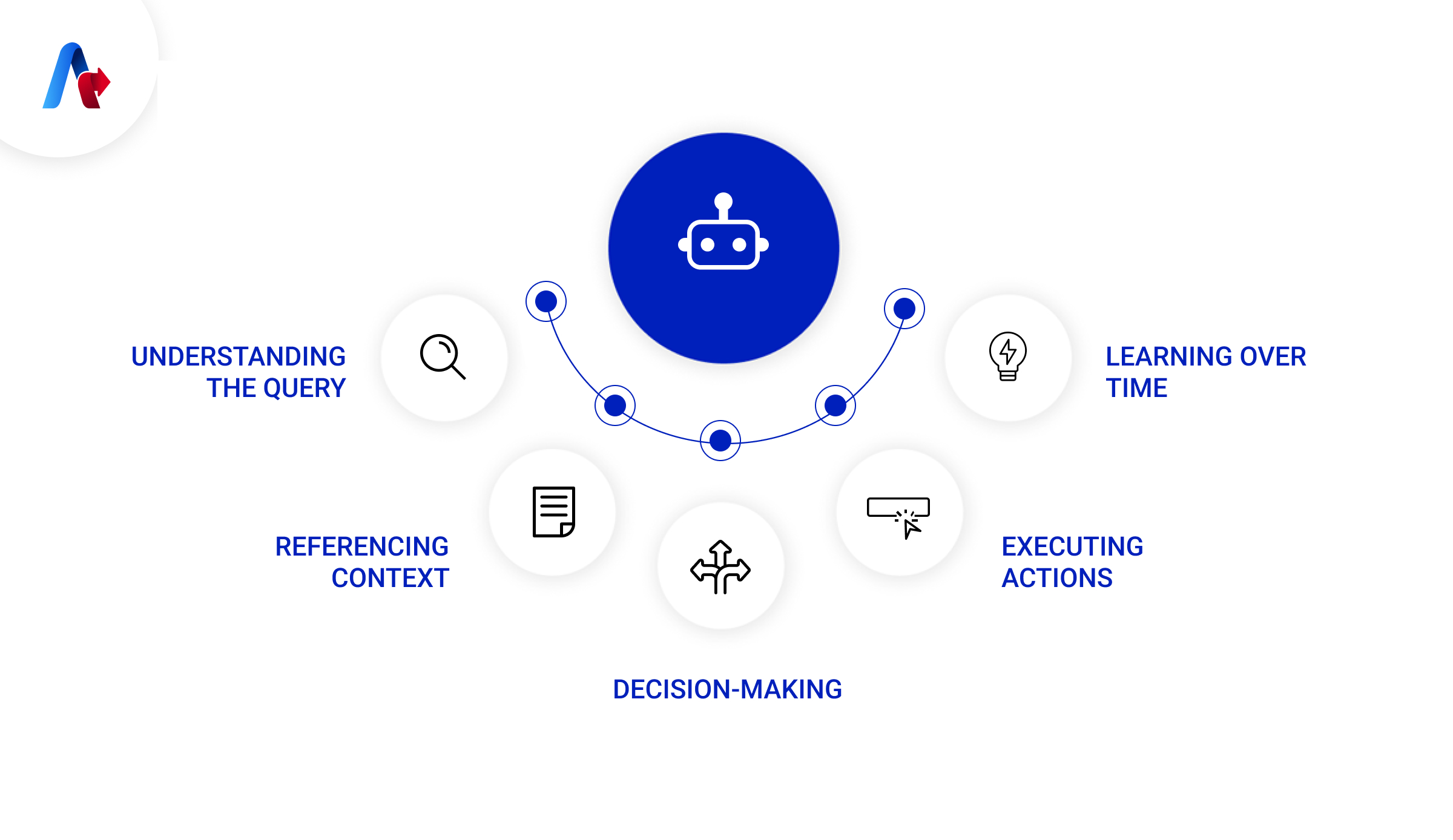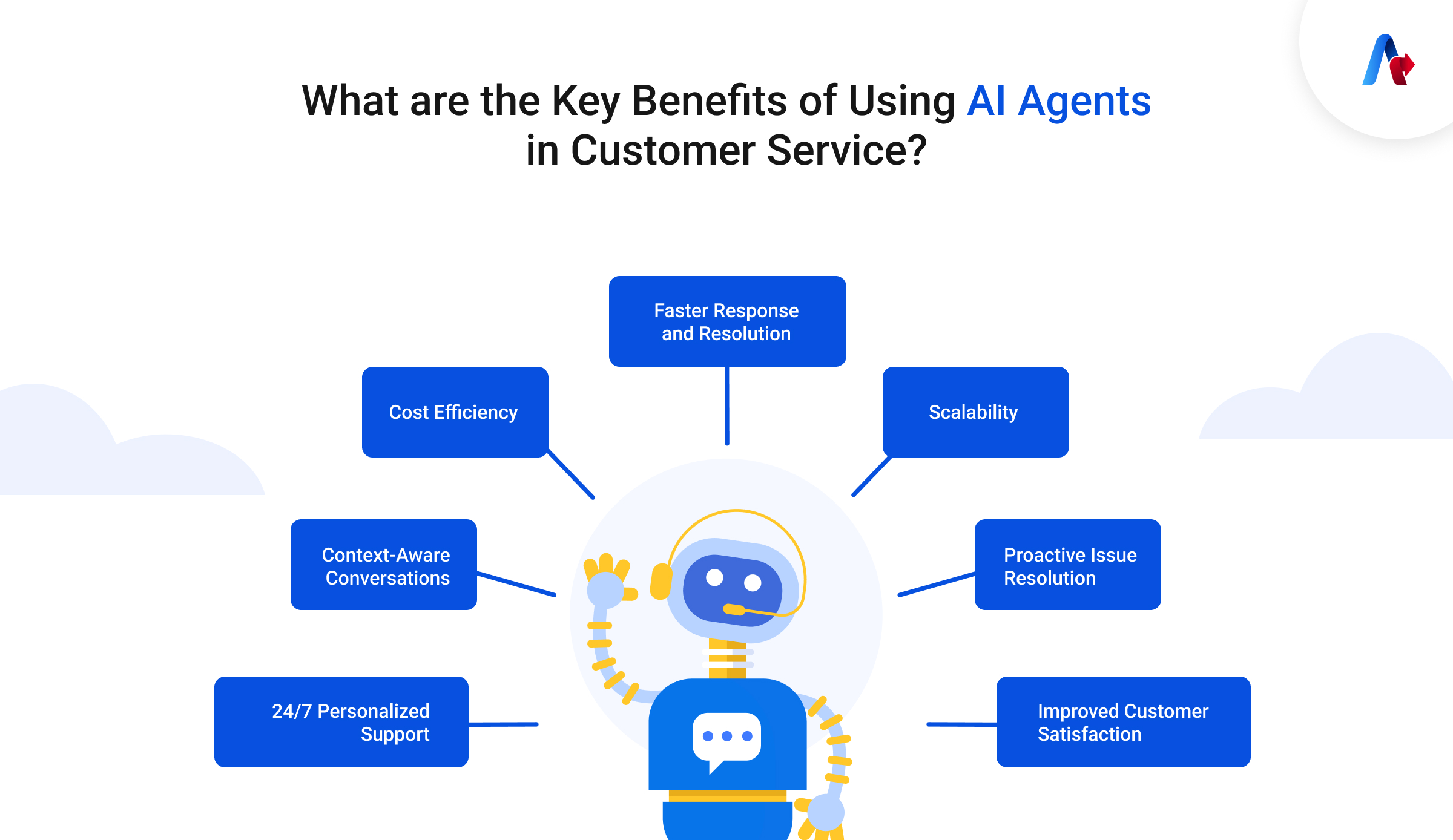Agentic AI in Customer Service
BLOG
11 min read
Agentic AI in Customer Service: Delivering Smarter, Faster, Better Experience
Quick Summary
Agentic AI is revolutionizing customer service by delivering intelligent, goal-driven support that goes beyond traditional chatbots. These AI agents understand context, make decisions, and resolve issues end-to-end—offering fast, personalized, and scalable customer experiences. Unlike scripted automation, they learn from interactions and improve over time. From smart ticket triage and proactive support to multilingual conversations and predictive personalization, agentic AI enhances efficiency, satisfaction, and loyalty—making it a key driver in the future of AI-powered customer experience.
Let it be any service or industry, customers expect support that is instant, personalized, and effortless. Long wait times, scripted responses, and disconnected service channels frustrate users—often driving them to competitors. When businesses fail to meet these expectations, it results in lost loyalty and revenue.
This is where agentic AI is set to reshape customer service. Unlike traditional automation tools or rule-based chatbots, agentic AI agents are intelligent, goal-driven systems that actively understand customer intent, make decisions, and take end-to-end action to resolve issues.
These agents continuously learn from interactions, adapt based on customer behavior, and improve over time—offering faster, smarter, and more human-like support for complex service scenarios.
According to Gartner, by 2029, agentic AI will autonomously resolve 80% of common customer service issues without human intervention, leading to a 30% reduction in operational costs. This shift is not just a trend—it's a transformation that forces service teams to embrace intelligent automation to stay competitive, enhance customer satisfaction, and scale efficiently.
What is an Agentic AI for Customer Service?
AI agents in customer service means software agents that can do things on their own and are powered by large language models (LLMs) and frameworks for making decisions.
These agents can plan things, change their plans based on new information, and talk to customers in a way that feels natural to fix problems, bring up issues, and make things more personal.
- Operate with context awareness: Agentic AI customer service applications knows the full context of a conversation, so it can give answers that are correct and relevant instead of just random ones.
- Learn from past interactions: These agents remember past conversations with customers so they can give more personalized answers and improve over time.
- Take proactive steps based on customer behavior: They plan ahead for what customers will need and do things before they ask, like sending reminders or offering solutions ahead of time.
- Manage multi-turn conversations independently: Agentic AI in customer experience can keep track of complicated conversations that go back and forth, helping customers smoothly reach a solution.
Agentic AI agents don’t just respond; they think and resolve the problem.
How AI Agents for Customer Service Work?

AI agents for customer service use advanced language understanding, memory, and decision-making skills to handle complicated customer interactions on their own.
- Understanding the Query When a customer sends a message, the AI agent uses a Large Language Model (LLM) to figure out what the person wants and how they feel about it, whether it's a complaint, a request, or a question.
- Referencing Context Using its contextual memory and connections to CRMs or databases, the agent pulls in useful information like past interactions, customer history, or product details.
- Decision-Making The agent uses a decision engine to figure out the best way to handle the situation based on the intent and context. This could mean fixing the problem, asking more questions, or passing it on to a human.
- Executing Actions It then uses backend integrations or task orchestration tools to do the job that needs to be done, like updating a ticket, giving a refund, or sending a personalized response.
- Learning Over Time The agent gets better at understanding and doing its job with each conversation, which makes it easier to give better support in future conversations.
In short, AI agents in customer service can handle full conversations from start to end, providing customer service that is real-time, smart, and scalable without the need for constant human input.
Ready to elevate your customer service with Agentic AI?
Request a demoAgentic AI Vs Traditional Customer Service: What’s the Difference?
As customers' expectations rise, businesses need to change the way they do business. Moving from traditional models to agentic AI in customer experience is a big step up from reactive, rule-based support to proactive, goal-driven engagement.
Agentic AI agents in customer service can figure out what's going on, make choices on their own, and get better with each interaction.
| Feature | Traditional Customer Service | Agentic AI Customer Service |
|---|---|---|
| Response Type | Scripted, rule-based replies | Intelligent, contextual replies |
| Availability | Business hours only | 24/7 support, no downtime |
| Scalability | Limited by human agents | Scales instantly without extra cost |
| Problem Solving | Often needs escalation | Resolves issues end-to-end independently |
| Personalization | Minimal, based on static data | Dynamic, behavior-based personalization |
| Learning Capability | Fixed workflows | Learns and improves from interactions |
| Omnichannel Support | Disconnected across platforms | Seamless experience across all channels |
Why this matters:
Traditional customer service can be slow, confusing, and unsatisfying. Agentic AI customer service applications change the game by making every interaction quick, smart, and tailored to the customer.
What are the Key Benefits of Using AI Agents in Customer Service?

AI agents in customer service provide 24/7 personalized support, speeding up response and resolution times while reducing costs. They enhance customer satisfaction by delivering smarter, context-aware, and proactive service at scale.
The key benefits are:
24/7 Personalized Support
AI agents are always available to help you immediately, no matter what time zone or business hours you are in.
Faster Response and Resolution
AI agents greatly reduce wait times and speed up problem solving by quickly understanding and acting on what customers want. In general, this makes things work better.
Organizations using AI in customer service applications can reduce average handling time by up to 40%, improving speed and efficiency.
Improved Customer Satisfaction
Consistently giving accurate, relevant, and timely answers helps build trust and loyalty, which leads to higher customer satisfaction scores.
Cost Efficiency
By automating simple and repetitive questions, human agents can focus on harder tasks. This means that less staff support is needed, which lowers costs.
Scalability
AI agents can easily handle thousands of customer interactions at once, which means businesses can grow their support operations without having to hire more people. Agentic AI is a game changer for businesses that want to grow without hiring more people.
Proactive Issue Resolution
AI agents can improve the customer experience by proactively reaching out to customers to stop problems before they get worse. They do this by looking at how customers act and predicting what might go wrong.
Context-Aware Conversations
These agents remember past interactions and customer preferences, which lets them have smooth, multi-turn conversations without making customers repeat themselves.
Top Use Cases for AI Agents in Customer Service?
Agentic AI use cases in customer service are changing the way customer service works by taking on a lot of tasks that used to need human agents. These smart AI agents make things run more smoothly, more accurately, and with happier customers by automating complicated tasks and getting involved before they happen.
Here are some important agentic AI customer service applications that provide better, faster, and smarter service:
Smart Ticket Triage & Resolution
AI agents make support easier by automatically sorting tickets by how urgent they are and what kind of problem they are. This speeds up the response time and gives agents less work to do.
Use cases:
- Automatically sorting incoming support requests by priority
- Fixing simple problems like resetting passwords or getting status updates without human help
- Quickly sending complicated problems to the right teams
Multilingual Virtual Agents
Agentic AI helps customers in many languages, breaking down language barriers and providing the same service all over the world.
Use cases:
- Answering customer questions in languages like Spanish, French, Chinese, and others
- Making it easy for people to talk to each other by translating conversations in real time
- Giving help and answers that are appropriate for the culture
Product Recommendation & Upselling
AI agents suggest relevant products or upgrades during interactions based on what customers like and what they've bought in the past, which naturally increases sales.
Use cases:
- Suggesting other items or accessories that go well with what you've already bought
- Offering people personalized discounts or deals during chats
- Helping customers understand how to use product features to get them to upgrade
Related Read: Top 25 Agentic AI Use Cases Across Industries
Proactive Issue Resolution
AI agents find possible problems early and contact customers with solutions before they get worse, which makes customers happier.
Use cases:
- Letting customers know ahead of time about shipping delays or problems with their orders
- Detecting failed payments and helping with reprocessing
- Letting users know when services are down and giving them other options
Proactively solving issues matters—businesses that do so experience 3–5% higher customer retention, and AI agents in customer service make this proactive model scalable
Feedback Analysis & Insights
AI analyzes customer feedback in real time to find trends and changes in mood, which helps businesses make quick changes to improve service.
Use cases:
- Checking reviews, surveys, and chat logs for satisfaction signals
- Finding common complaints or requests for features
- Making reports for customer service teams to help them decide what to fix first
Self-Service Enablement
AI agents give customers smart, guided support tools that help them find answers and fix problems on their own.
Use cases:
- Offering dynamic FAQs that change based on user questions
- Helping customers fix problems step by step
- Giving users personalized knowledge base articles based on their past activity
What's Your Use Case?
We have a solution
for you
Get Expert Consultation
The Future of Agentic AI in Customer-Centric Service and Loyalty
In a world where experiences matter, the future of agentic AI in customer experience is all about creating highly personalized journeys that are all about the customer and that build long-term loyalty. These AI agents will do more than just help; they'll become digital brand ambassadors who learn and adapt to each customer's needs, wants, and behaviors all the time.
Future-focused benefits include:
- Emotionally Intelligent Interactions The ability to analyze emotions will get better, which will let AI agents respond with empathy by changing their tone and approach based on how the customer is feeling.
- Predictive Personalization Agentic AI will use real-time behavior and intent signals to offer solutions, content, or products to customers before they even know they need them.
- Seamless Omni-Channel Experience AI agents will follow customers across chat, email, voice, and social media, making sure that they get the same help no matter where they are.
- Loyalty-Driven Engagement AI agents will help build stronger emotional connections and encourage support for brands by identifying high-value customers and customizing interactions with them.
- Continuous Self-Learning An AI agent gets smarter the more interactions it has, automatically updating its knowledge to meet the changing needs of customers.
Agentic AI in customer service applications isn't just about fixing problems; it's also about putting the customer first, building relationships, making them happy, and keeping them coming back.
Empowering Customer Experience with Agentic AI
The future of customer service is no longer just automated—it’s intelligent, autonomous, and adaptive. Agentic AI is transforming customer experience by enabling personalized, real-time, and scalable support through goal-driven AI agents that learn, adapt, and take proactive actions.
As businesses strive to meet rising customer expectations, agentic automation offers a powerful path forward. Accelirate, a leading provider of Agentic Automation solutions, helps enterprises build and deploy customized AI agents tailored to their unique service goals—enabling smarter, faster, and more human-centric customer interactions at scale.
Now is the time to embrace the next frontier of customer service with Agentic AI.
FAQs
By giving quick, correct, and personalized answers. They know what's going on, remember your preferences, and help you out before you even ask, making your customer journey smoother and more enjoyable.
Businesses must make sure that AI agents handle data safely, openly, and ethically because of rules like GDPR, CCPA, and industry-specific compliance standards (like HIPAA in healthcare).
- Telecom: AI agents fixing network problems and helping customers move up to better plans.
- eCommerce: Virtual assistants handle returns and recommend products.
- Banking: AI agents find patterns of fraud and help with accounts 24/7.
- Travel: Virtual agents can change flight times, deal with cancellations, or help with visas.


